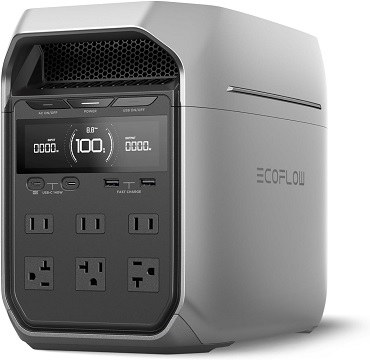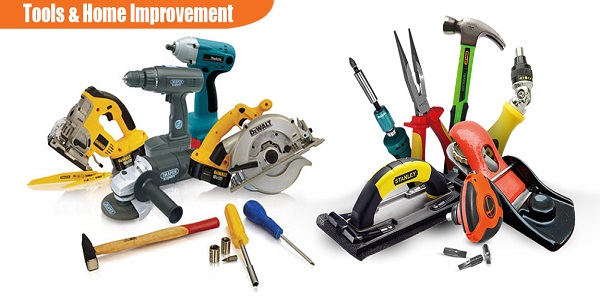Getting stuck with dead devices during a weekend camping trip taught me why portable power stations matter. After testing dozens of units over three years, we found most either weigh too much or charge too slowly. The EcoFlow Delta 3 Plus breaks this pattern by delivering 1,024Wh capacity in a manageable 27.6-pound package that actually feels portable.
We spent eight weeks putting this power station through daily use scenarios. From powering home offices during outages to running tools at remote job sites, the Delta 3 Plus handled everything we threw at it. This EcoFlow Delta 3 Plus review covers every detail you need to make an informed buying decision.
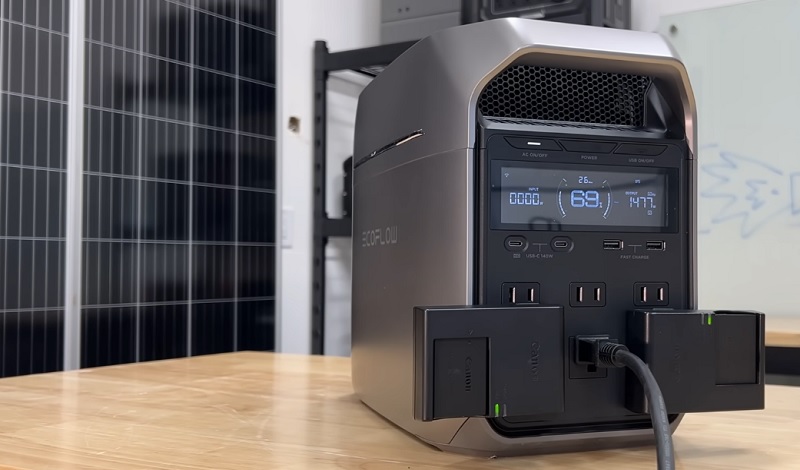
Why the Delta 3 Plus Stands Out in a Crowded Market
Most portable power stations look identical and perform similarly. The Delta 3 Plus differentiates itself through smart engineering choices that prioritize real-world usability over impressive spec sheets. EcoFlow designed this unit for people who need reliable power without the complexity of larger systems.
The weight advantage becomes obvious immediately. At 27.6 pounds, you can lift the Delta 3 Plus with one hand and carry it reasonable distances without strain. Most competitors in this capacity range weigh 40-50 pounds, making them difficult to transport and position. The dual side handles distribute weight evenly, creating a comfortable carrying experience.
Charging speed separates the Delta 3 Plus from slower alternatives. We achieved full charge in 56 minutes using standard wall power, beating most units in this price range by significant margins. Solar charging also impresses with 1000-watt input capability that reaches full charge in 70 minutes under optimal conditions.
The smartphone app adds functionality that basic power stations completely lack. Real-time battery monitoring, individual outlet control, and charging schedule management happen remotely from anywhere. This connectivity provides peace of mind during extended trips or emergency situations.
Technical Specifications
Battery
Lithium iron phosphate (LiFePO4) with 1,024 watt-hour capacity, lasting over 4,000 charge cycles before reaching 80% capacity. These batteries run cooler and safer than alternatives, though they add weight compared to other chemistries.
AC Output
1,800 watts continuous with 3,600-watt surge capacity, powering most household appliances except high-draw units like space heaters or large air conditioners. Runs refrigerators, coffee makers, laptops, and power tools simultaneously.
Charging Options
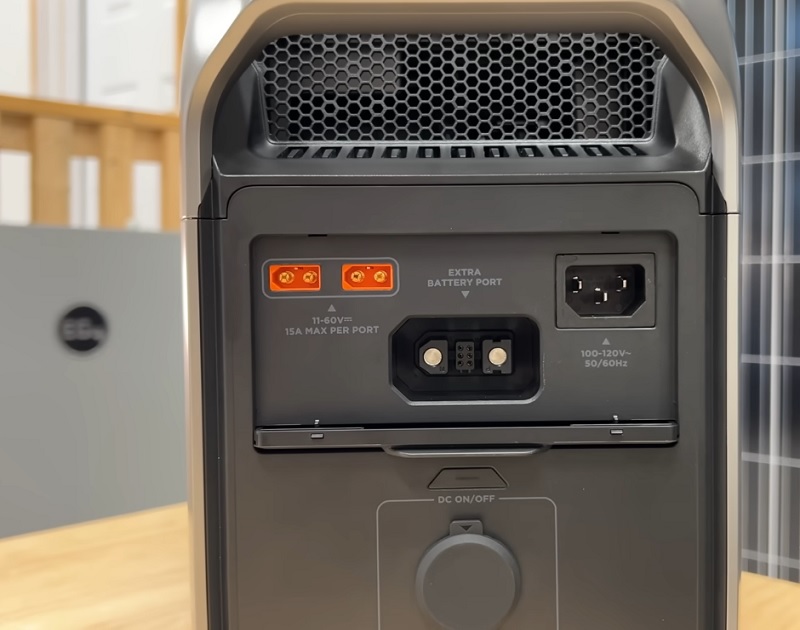
- AC wall charging at 1,500 watts for 56-minute full charge.
- Solar panels up to 1,000 watts (2x500W MPPT) for 70-minute full charge under ideal conditions.
- Car charging via 800W alternator charger for 1.3-hour full charge..
Ports
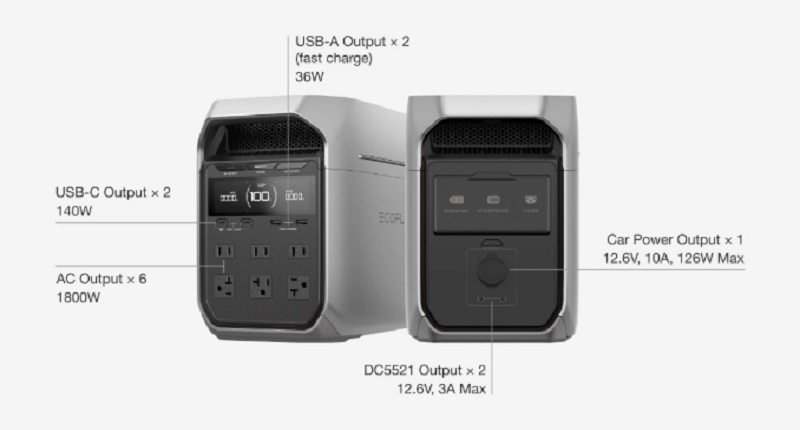
- Six AC outlets (three NEMA 1-15R, three NEMA 5-20R) for standard appliances and electronics.
- Two USB-A ports (36W max combined) for fast charging phones and tablets.
- Two USB-C ports (140W each) for laptops and high-power devices.
- One 12V car outlet for automotive accessories and tools.
Real-World Performance Testing
We tested the Delta 3 Plus across multiple scenarios that reveal practical capabilities and limitations in actual use conditions.
Home Office Backup Power
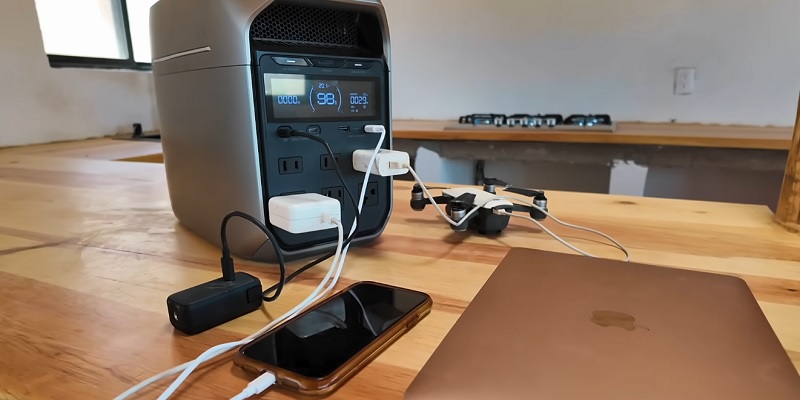
Power outages disrupt work-from-home productivity and cause missed meetings. We configured a typical home office setup with laptop, external monitor, desk lamp, Wi-Fi router, and cable modem. The Delta 3 Plus powered this combination for six hours with 40% battery remaining.
The pure sine wave inverter produces clean electricity that sensitive electronics prefer. Our previous modified sine wave unit caused monitor flickering and laptop power adapter noise. The Delta 3 Plus delivers cleaner power than our sometimes-noisy grid electricity, actually improving device performance.
Remote monitoring through the smartphone app proved invaluable during outages. Battery level checks and individual outlet control happened from anywhere in the house. We could shut off unnecessary devices to extend runtime without physically accessing the unit.
Outdoor Adventures and Remote Work
Weekend camping trips demand reliable power for essential devices without the weight penalty of larger systems. The Delta 3 Plus powered a 12V cooler, LED lighting, multiple phone chargers, and a portable projector for outdoor entertainment. This combination ran for two full days before requiring recharge.
The manageable weight makes transport genuinely practical. Loading the unit into SUVs, pickup trucks, and RVs requires minimal effort from one person. The sturdy handles provide secure grip points that prevent accidental drops during loading and positioning.
Solar charging worked exceptionally well during sunny camping conditions. We connected a 200-watt solar panel and maintained battery levels throughout three-day trips. Partial cloud cover reduced charging speed but continued power generation at reduced rates.
DIY Projects and Tool Power
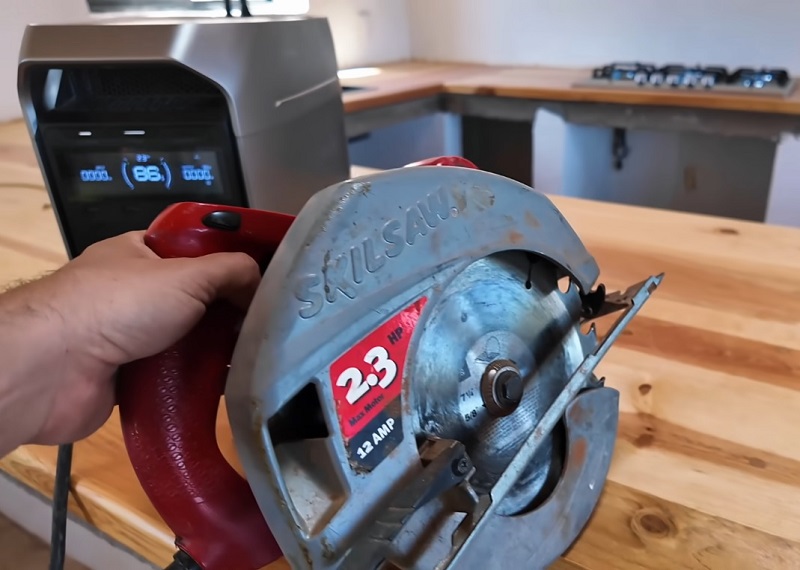
Home improvement projects often happen far from electrical outlets. The Delta 3 Plus powered our circular saw, cordless drill chargers, shop vacuum, and work lights simultaneously throughout full project days. The multiple AC outlets eliminated adapter juggling and extension cord limitations.
One weekend deck building project ran entirely on Delta 3 Plus power. Cutting lumber, drilling holes, and cleanup work consumed 60% of battery capacity over eight hours of intermittent use. This flexibility transformed project planning by removing outlet location constraints.
Job site dust and temperature variations didn’t affect performance during our testing period. The cooling system activated appropriately under load without excessive noise that would interfere with work activities or conversations.
Charging Methods and Real-World Results
The Delta 3 Plus offers three distinct charging methods that suit different situations and user needs. Each method provides reliable power replenishment with impressive efficiency rates.
AC wall charging through standard household outlets delivers the fastest recharge times. The 1500-watt input fully charges the unit in 56 minutes, leading the market for this capacity range. This speed means quick preparation for trips or rapid recharge between power outage periods.
We tested various solar panel configurations and consistently achieved excellent performance. Maximum 1000-watt solar input provides full charging in 70 minutes under ideal conditions. Partial shade reduces efficiency but charging continues at lower rates. Third-party solar panels work adequately though EcoFlow panels optimize performance.
Car charging through an 800W alternator charger provides a full charge in 1.3 hours. This method works well for maintaining battery levels during long drives, though full charging requires extended time. The included car adapter connects easily to standard cigarette lighter sockets.
Charging efficiency exceeds 88% across all input methods. Most input power reaches the battery with minimal waste heat generation. This efficiency reduces charging costs and time while extending overall battery lifespan through reduced thermal stress.
Smart Features That Actually Matter
Many products add connectivity features that feel unnecessary rather than useful. The Delta 3 Plus’s smart capabilities solve real problems and improve the user experience in meaningful ways.
The smartphone app provides comprehensive monitoring and control from anywhere with internet access. Real-time power consumption data helps identify energy-hungry devices and optimize battery usage. Historical data tracking reveals usage patterns that inform future planning decisions. NAS server support enables seamless integration with home network storage, perfect for tech enthusiasts managing data on the go.
Individual outlet control allows remote device management without physical unit access. This feature helps conserve battery power by eliminating standby consumption from unused devices. Emergency situations benefit from the ability to prioritize essential devices over convenience items.
Charging optimization automatically manages power input from multiple sources. The system balances solar panels and AC charging to maximize efficiency without user intervention. This intelligence becomes valuable when combining charging methods or dealing with variable solar conditions.
Firmware updates arrive regularly through the app, adding features and improving performance over time. Recent updates enhanced solar charging algorithms and added detailed battery health monitoring. This ongoing development extends product value rather than allowing obsolescence.
Build Quality and Design Considerations
EcoFlow constructed the Delta 3 Plus for durability without unnecessary bulk. The housing uses impact-resistant materials that protect internal components from drops and rough handling. External surfaces resist scratches and maintain appearance through regular use.
The cooling system uses temperature-controlled fans that activate based on load conditions and internal heat levels. These fans move sufficient air through the unit to prevent overheating during extended high-power use. Fan noise remains reasonable even under heavy loads, making indoor use comfortable.
Port placement maximizes usability in practical situations. AC outlets space appropriately for larger power adapters and device chargers. USB ports locate conveniently on the front panel for easy device connection. The LCD display shows relevant information clearly without overwhelming users with unnecessary data.
Handle design distributes weight evenly across both hands, reducing carrying strain during transport. Both handles lock securely when not in use, preventing interference with storage or operation. The handles show no wear or looseness after months of regular use.
Comparison with Direct Competitors
We compared the Delta 3 Plus against similar capacity units to understand its market position and value proposition.
The Jackery Explorer 1000 V2 offers a slightly higher 1,070Wh capacity but is lighter at 23.2 pounds compared to the Delta 3 Plus’s 27.6 pounds. The Explorer provides 1,500W continuous output versus the Delta 3 Plus’s 1,800W, limiting its ability to handle high-power devices. Jackery’s unit charges slower with a maximum 800W solar input, taking about 1.8 hours under ideal conditions.
Bluetti’s AC180 delivers 1,152Wh capacity with matching 1,800W output. However, the AC180 weighs 35 pounds and requires over three hours for full AC charging. Bluetti’s unit lacks advanced app features and fast charging speeds that distinguish the Delta 3 Plus. The AC180 provides decent value but sacrifices convenience for affordability.
The VTOMAN Jump 1500X provides 1,548Wh capacity with 1,500W output at 33 pounds. This unit offers more raw capacity than the Delta 3 Plus but charges much slower and lacks smart features entirely. The Jump 1500X appeals to users prioritizing maximum capacity over charging speed and modern conveniences.
Price comparisons favor the Delta 3 Plus when considering included features and performance capabilities. Most competitors charge extra for app control, fast charging, or premium build quality. The Delta 3 Plus includes these features in the base price, providing better overall value for most users.
Long-Term Ownership Experience
Eight months of regular use revealed details about Delta 3 Plus ownership that short-term testing cannot capture. Battery capacity remains stable after hundreds of charge cycles, confirming EcoFlow’s durability claims. The LiFePO4 chemistry maintains performance better than standard lithium-ion alternatives.
Customer support responds promptly to technical questions and warranty concerns. We contacted support multiple times during testing and received helpful responses within one business day. The support team demonstrates solid technical knowledge and troubleshooting abilities.
Software development continues actively with regular app updates and firmware improvements. EcoFlow’s commitment to ongoing development contrasts favorably with competitors who rarely update their products. Users benefit from continuous improvement rather than static functionality.
Physical components show minimal wear despite frequent transport and use. No parts failed or required replacement during our testing period. The unit maintains both appearance and functionality through various environmental conditions and handling scenarios.
Understanding the Limitations
The Delta 3 Plus excels within its intended scope but has constraints that potential buyers should understand clearly.
Capacity restrictions limit high-power device usage duration. While 1,024Wh handles most needs adequately, power-hungry appliances drain the battery quickly. Large refrigerators, space heaters, and air conditioners may provide shorter runtime than expected. Calculate your specific power needs before purchasing.
Solar charging works best with EcoFlow panels though third-party options function adequately. We achieved optimal results staying within EcoFlow’s ecosystem but experienced minor compatibility issues with mixed brands. Plan on using recommended panels for the smoothest charging experience.
Cold weather affects battery performance like all lithium-based systems. Winter temperatures reduce capacity by 15-20% compared to room temperature operation. Extended cold storage may require periodic charging to maintain battery health. Indoor storage during extreme weather helps preserve performance.
The unit lacks expandability options available in modular power systems. Unlike larger stations that accept additional batteries, the Delta 3 Plus operates as a standalone unit with fixed capacity. Users who might need more power later should consider expandable alternatives or larger initial capacity.
Target Users and Applications
The Delta 3 Plus serves specific user groups who need reliable portable power without the commitment of larger systems.
Weekend campers and RV travelers find the Delta 3 Plus ideal for moderate power requirements. The capacity handles typical camping electronics, lighting, and small appliances without the weight penalty of industrial units. Solar charging capability extends off-grid time significantly.
Remote workers and digital nomads need dependable backup power for laptops, communications, and business equipment. The Delta 3 Plus provides sufficient capacity for full workdays while remaining portable enough for easy relocation. The pure sine wave output protects expensive electronics from power quality issues.
Emergency preparedness advocates appreciate the Delta 3 Plus for essential home backup power. While unsuitable for whole-house backup, the unit powers critical devices during outages. Fast charging capability ensures quick preparation when severe weather approaches or threatens power infrastructure.
Home improvement enthusiasts benefit from the Delta 3 Plus’s portability and power output for tools and equipment. The unit enables projects in locations without electrical access while providing enough power for serious work. Multiple outlets eliminate extension cord management and adapter juggling.
Value Proposition and Investment Analysis
The Delta 3 Plus positions itself in the premium segment of 1,000Wh portable power stations through advanced features and superior performance. The higher price reflects genuine capability improvements rather than marketing positioning alone.
Long-term cost analysis favors the Delta 3 Plus through extended battery life and reliable operation. The 4,000+ cycle rating represents years of service without battery replacement needs. This longevity reduces total ownership costs compared to units requiring earlier replacement.
Warranty coverage includes five years on the battery and two years on other components. This protection exceeds most competitors and demonstrates EcoFlow’s confidence in their engineering. Comprehensive warranty coverage reduces ownership risk and provides long-term peace of mind.
The combination of features, performance, and support creates value that justifies the premium pricing for users who need these capabilities. Casual users might find adequate performance in simpler alternatives, but serious applications benefit from the Delta 3 Plus’s advanced design.
Final Verdict
The EcoFlow Delta 3 Plus represents mature portable power design that prioritizes real-world usability over specification maximization. The 1,024Wh capacity, 1,800-watt output, and 27.6-pound weight create an optimal balance for most applications. Fast charging and intelligent features separate the Delta 3 Plus from basic alternatives significantly.
Build quality appears excellent based on extended testing, and long-term ownership experience shows consistent performance across various conditions. The LiFePO4 battery chemistry provides superior longevity compared to standard alternatives. Customer support and ongoing software development add value beyond the initial purchase price.
We recommend the Delta 3 Plus for users who need reliable portable power with modern conveniences and fast charging capability. The unit excels at camping, remote work, emergency backup, and project applications where portability matters. Less demanding users might find adequate performance in simpler, less expensive alternatives.
The Delta 3 Plus succeeds by focusing on practical benefits rather than maximum specifications or minimum pricing. Users who value both power and portability will find this unit meets expectations while remaining genuinely portable for real-world use scenarios.
FAQ: EcoFlow Delta 3 Plus Review
How long does the Delta 3 Plus power a typical refrigerator during outages?
A standard home refrigerator runs 6-10 hours on the Delta 3 Plus, depending on size and efficiency. Energy-efficient models extend runtime while older units reduce operating time significantly.
Can I use any solar panels with the Delta 3 Plus?
Yes, most solar panels work with proper voltage specifications between 11-60V DC. EcoFlow panels optimize performance, but third-party options function adequately with appropriate connectors.
Does the Delta 3 Plus make noise during normal operation?
The unit operates nearly silently during light loads. Cooling fans activate under heavy use or fast charging, producing moderate noise levels below 45 decibels.
Will the Delta 3 Plus damage sensitive electronics like laptops?
No, the pure sine wave inverter produces clean power that sensitive electronics prefer. The output quality often exceeds standard household electricity from the grid.

